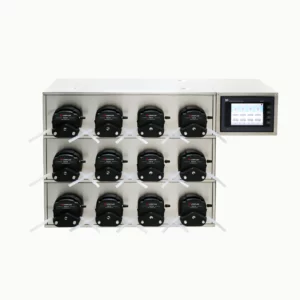In various industries ranging from pharmaceuticals to food and beverage production, precise liquid handling is crucial for maintaining quality and efficiency. Among the array of liquid handling technologies available, peristaltic pumps have emerged as a versatile and reliable solution. In this article, we delve into the workings and applications of peristaltic pumps, particularly focusing on the advancements represented by the peristaltic head and precision peristaltic pump, as well as their role in liquid filling machines.

Understanding Peristaltic Pump Technology
Peristaltic pumps operate on the principle of peristalsis, mimicking the natural rhythmic contraction and relaxation of muscles in biological systems. This unique mechanism involves the rotation of rollers or shoes within a flexible tube, creating a series of occlusions that propel fluid through the tube without contacting the pump components directly. As a result, peristaltic pumps offer several advantages:
- Contamination Prevention: Since the fluid only comes into contact with the interior of the tubing, there is minimal risk of contamination from the pump itself, making peristaltic pumps ideal for sterile or sensitive applications.
- Accurate and Gentle Fluid Handling: The gentle squeezing action of peristaltic pumps ensures that delicate fluids, such as cell cultures or shear-sensitive liquids, remain unaltered during transfer.
- Versatility: Peristaltic pumps can handle a wide range of fluids, from corrosive chemicals to viscous solutions, without the need for complex adjustments or specialized configurations.
The Peristaltic Head: Enhancing Precision and Efficiency
The peristaltic head represents a critical component of modern peristaltic pump systems. This component houses the tubing and rollers/shoes responsible for fluid movement. Recent innovations in peristaltic head design have focused on improving precision, durability, and ease of maintenance:
- Enhanced Tubing Materials: Manufacturers have developed advanced tubing materials that offer superior chemical resistance, flexibility, and longevity, ensuring consistent performance over extended periods.
- Improved Roller Designs: Upgraded roller configurations, including variable-speed motors and adjustable compression mechanisms, enable finer control over flow rates and reduce tubing wear, enhancing pump reliability and efficiency.
- Intelligent Monitoring Systems: Integrated sensors and monitoring software provide real-time feedback on flow rates, pressure, and tubing condition, allowing operators to preemptively address potential issues and optimize pump performance.
Precision Peristaltic Pumps: Meeting Demands for Accuracy and Reproducibility
Precision peristaltic pumps represent a specialized category tailored to applications requiring exceptional accuracy and reproducibility. These pumps incorporate advanced features such as:
- Microstepping Technology: Precise motor control mechanisms, such as microstepping drivers, enable ultra-fine adjustments to flow rates, ensuring precise dispensing and metering of fluids, even in microliter volumes.
- Calibration Capabilities: Built-in calibration routines and software algorithms facilitate accurate volume measurements and calibration traceability, essential for industries where compliance with regulatory standards is paramount.
- Multi-Channel Configurations: Some precision peristaltic pumps offer multi-channel configurations, allowing simultaneous handling of multiple fluids with independent control over each channel, optimizing workflow efficiency in complex applications.
Applications of Precision Peristaltic Pump
Precision peristaltic pumps are specialized fluid handling devices designed to deliver accurate and consistent flow rates for various applications that require precise control over fluid transfer. Here are some key applications where precision peristaltic pumps excel:
- Analytical Instruments: Precision peristaltic pumps are commonly used in analytical instruments such as spectrophotometers, liquid chromatography systems, and mass spectrometers. They ensure a stable and continuous flow of samples, reagents, and solvents, crucial for obtaining reliable analytical results.
- Biotechnology and Pharmaceutical Research: In biotechnology and pharmaceutical laboratories, precision peristaltic pumps are utilized for tasks like cell culture media perfusion, drug discovery assays, and DNA sequencing. The ability to accurately dispense small volumes of liquids without contamination is essential for maintaining experimental integrity and reproducibility.
- Medical Devices: Precision peristaltic pumps play a vital role in various medical devices and equipment, including infusion pumps, dialysis machines, and diagnostic systems. They provide precise dosing of medications, fluids, and biological samples, ensuring patient safety and treatment efficacy.
- Microfluidics: In microfluidic applications, where minute volumes of fluids are manipulated on a microscale, precision peristaltic pumps are crucial for controlling flow rates and directing liquids through microchannels. They are used in research areas such as lab-on-a-chip technology, point-of-care diagnostics, and microreactor systems.
Peristaltic Pump Liquid Filling Machines: Streamlining Production Processes
In industries such as pharmaceutical manufacturing, cosmetics, and specialty chemicals, the demand for automated liquid filling solutions continues to grow. Peristaltic pump liquid filling machines offer several advantages over traditional filling methods:
- Clean and Hygienic Operation: The closed-system design of peristaltic pumps minimizes the risk of product contamination, ensuring compliance with stringent regulatory requirements for product purity and safety.
- Flexible and Versatile: Liquid filling machines equipped with peristaltic pumps can accommodate a wide range of container sizes and shapes, as well as different viscosities and volumes, without the need for extensive retooling or adjustments.
- High Precision and Efficiency: The precise control afforded by peristaltic pumps ensures accurate filling volumes and minimizes product waste, ultimately improving production efficiency and reducing costs.
Peristaltic pump technology, with its inherent advantages of precision, versatility, and contamination-free operation, continues to play a vital role in various industries where accurate fluid handling is paramount. The evolution of peristaltic heads and the development of precision peristaltic pumps have further expanded the capabilities and applications of this technology, offering solutions tailored to the most demanding requirements. As automation and efficiency become increasingly important in modern manufacturing processes, peristaltic pump liquid filling machines stand out as a reliable and cost-effective solution for achieving consistent and high-quality results.